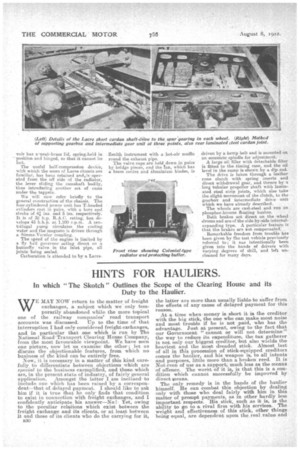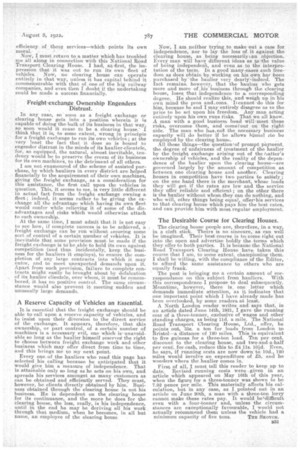HINTS FOR HAULIERS.
Page 14

Page 15

If you've noticed an error in this article please click here to report it so we can fix it.
In which "The Skotch " Outlines the Scope of the Clearing House and its Duty to the Haulier.
WE MAY NOW return to the matter of freight exchanges, a subject which we only temporarily abandoned while the more topical one of the railway companies' road transport accounts was discussed. Up to the time of that interruption I hael only considered freight exchanges, and in particular that one which is run by The National Road-Transport Clearing House Company, from the most favourable viewpoint. We have seen one picture, now let us examine the other ; let us dismiss the objectionable feature's, from which no business of the kind can be entirely free. Now, it is necessary in a matter of this kind carefully to differentiate between objections which are special to the business exemplified, and those which are, in the present state of industry, of fairly general application. Amongst the latter I am inclined to include one which has been raised by a correspondent—that of delayed payment. I should like to ask him if it is true that he only finds that condition to exist in connection with freight exchanges, and I confidently anticipate his answer—No IYet, owing to the peculiar relations which exist between the freight exchange and its clients, or at least between it and those of its clients who do the carrying for it,
530 _ the latter are more than usually liable to suffer from the effeets of any cause of delayed payment for this reason.
At a time when money is short it is the creditor with the big stick, the one who ears make most noise and most trouble if he is not paid, who has the advantage. Just at present, owing to the fact that our Governnaent "cannot or will not determine" the way to reduce its expenditure, the tax gatherer is not only our biggest creditor, but also wields the heaviest and the most dreaded stick. Almost last of all in this procession of stick-equipped creditors comes the haulier, and his weapon is, to all intents and purposes, little more than a broken reed. It is Not even of use as a support, much less as the means of offence. The. worst of it is is that this is a condition which cannot successfully be improved by direct means.
The only remedy is in the hands of the haulier himself. He can combat this objection by dealing only with those who deal fairly with him in this matter of prompt payments, as in other hardly less important respects. Hiss stick, such as it is, is the ability to go to a rival firm with his services. The weight and effectiveness of this stick, other things being equal, are dependent upon the, real value and
efficiency of those services—which points its own moral.'
Now, -I must return to a matter which has troubled me all along in connection with this National Road Transport Clearing House. I had, at -first, the impression that it was out to run its own fleetof vehicles. Now, no clearing house can operate entirely in that way, unless it has capital behind it commensurable with that of one of the big railway companies, and even then I doubt if the undertaking could be made a success financially.
Freight-exchange Ownership Engenders Distrust.
In any case, so soon as a freight exchange or clearing house gets into a position wherein it is capable of doing the-bulk of its business in that way, so soon would it cease tte be a clearing house,' I think that it is, -to some extent, wrong in principle for a freight exchange to run its own vehicles; 4t the very least the fact that it does so is hound to engender distrust in the minds of its haulier-clientele, for, so equipped, the natural, almost inevitable, tendency -would be to preserve the cream of its business for its own machines, to the detriment of all others.
I am not enamoured of the scheme of assisted purchase, by which hauliers in every district are helped financially to the acquirement of their own machines, giving the freight exchange, as a consideration for this assistance, the first call upon the vehicles in 'question. This, it seems to me, is very little different in actual fact from the freight exchange owning a fleet ; indeed, it seems rather tobe giving the exchange all the advantage which having its own fleet would confer while relieving it of some of the disadvantages and risks which would otherwise attach to such ownership.
At the same time, I must admit that it is not easy to see how, if complete success is to be achieved, a freight exchange can be run without securing some sort of control of a certain number of vehicles. It is inevitable that some provision must be made if the freight exchange is to be Able to hold its own against competition (and thus incidentally, keep the business for the hauliers it employs), to ensure the completion of any large contracts into -which it may enter and to meet unexpected demands upon it Apart from such provision, failure to complete contracts might easily be brought about by defalcation of its haulier clientele, over whom, it must be remembered, it has DO positive control. The same circumstance would also -prevent it meeting sudden and unusually large demands.
• A Reserve Capacity of Vehicles an Essential.
It is essential that the freight exchange should be able to call upon a reserve capacity of vehicles, and to insist upon their diversion to the direct service of the exchange. It appears, therefore, that this ownership, or part control, of a certain number of machines is a necessary evil, one which is unavoidable so long as the haulier himself reserves, the right to choose between freight exchange work and other business which may offer direct from time to time, and this brings me to my next point.
Every one, of the hauliers who read this page has selected his -calling because he anticipated that it would give him a measure of independence. That is attainable only so long as he acts on his own, and spreads his services amongst as many customers as can be obtained and efficiently served. They must, however, be clients directly obtained by him. Business obtained through the clearing house is not his business, He is dependent on the clearing house for its continuance, and the more he does for the clearing house, the less, really, is his independence, until in the end he may be deriving all his work through that medium, when he becomes, in all but name, an employee of the clearing house
Now, I am neither trying to make out a case for. independence, nor to lay the loss of it against the clearing house, as being necessarilyaan objection. Every man will have different ideas as teethe value of being independeril, and even as to the interpretation of the term. In a good many-cases such freedom as does °Mail' by working on his own has been purchased by' the haulier very dearly-indeed. The fact remains, however, that the haulier who gets more and more of. his-business through the clearing house, loses that independence to a corresponding degree. He should realize this, and weigh up in his own mind the pros and, cons. • Is cannot .do this for him, because he and I may entirely disagree as to the price to be set upon his freedom. Any man acting entirely upon his own runs risks. That we all know. A man with a good business head will.meet these risks, overcome them, and comefout en the right side. The man who Ints.not the necessary business capacity will do better if he allows himeel to be employed by the clearing house.
All these things—the question !of prompt Payment, the degree of unfairness of treatment of the haulier by the freight exchange arising out of the Jiatter's ownership of vehicles, and the reality of the dependence of the haulier upon the clearing house—are governed largely by the amount of competition as between one clearing house and another. Clearing houses in compeslition have two parties to satisfy ; on the one .hand there is the merchant, whose loads they will get if the rates are low and the service they offer reliable and efficient; on the other there is the haulier without whom, they can do nothing, and who will other things being equal, offershis services to that clearing house which pays him the best rates, and can provide him with most regular employment.
The DesirableCourse for Clearing Houses.
The-clearing house people are, .the.refore, in a way, in a cleft stick. Theirs is no sinecure, as can well be imagined. Their best eourse is to come right out into the open and advertise boldly the terms which they offer to both parties. It is because the National Road Transport Clearing House have taken this course that I am, to some extent, championing them. I shall be willing, with the compliance of the Editor, to afford the same assistance to others who are equally frank. • The post is bringing me a -certain amount of correspondence on this subject from hauliers. With this correspondence I propose to deal subsequently. Meantime, however, there is, one letter which immediate mmediate attention, as it, indicates that one important point which I have already made has been overlooked, by some readers at least.
A North London reader writes and says that, in an article dated June 14th, 1921, I gave the running cost of a three-tonner, exclusive of wages and other standing charges, as being 11d, a mile. The National Road Transport Clearing House, Ltd., offer, he points out, 35s. a ton for loads from London to Bristol—a distance of 120 miles. This is equivalent to five guineas for a three-ton load. Ten per cent. discount to the clearing house, and two-and-a-half per cent', for -cash, reduce this to 24 us. lOid. Even, he says, if running cests are now down to 10d., 120 miles would involVe an expenditure of 25, and he wonders where the haulier comes in.
First of all, I must tell this reader to keep up to date. Revised running costs were given in an article which appeared on May 16th of this year, when the figure for a three-tonner was shown to be 7.92 pence per mile. This materially affects his calculation, but in any case, as I pointed out in an article on June 20th, a man with a three-ton lorry cannot make these rates pay. It would beiclifficult even with a four-tonner and, unless the circumstances are exceptionally favourable, I -would not actually recommend them unless the vehicle had a minimum capacity of five tons. THE SKOTCII.
































